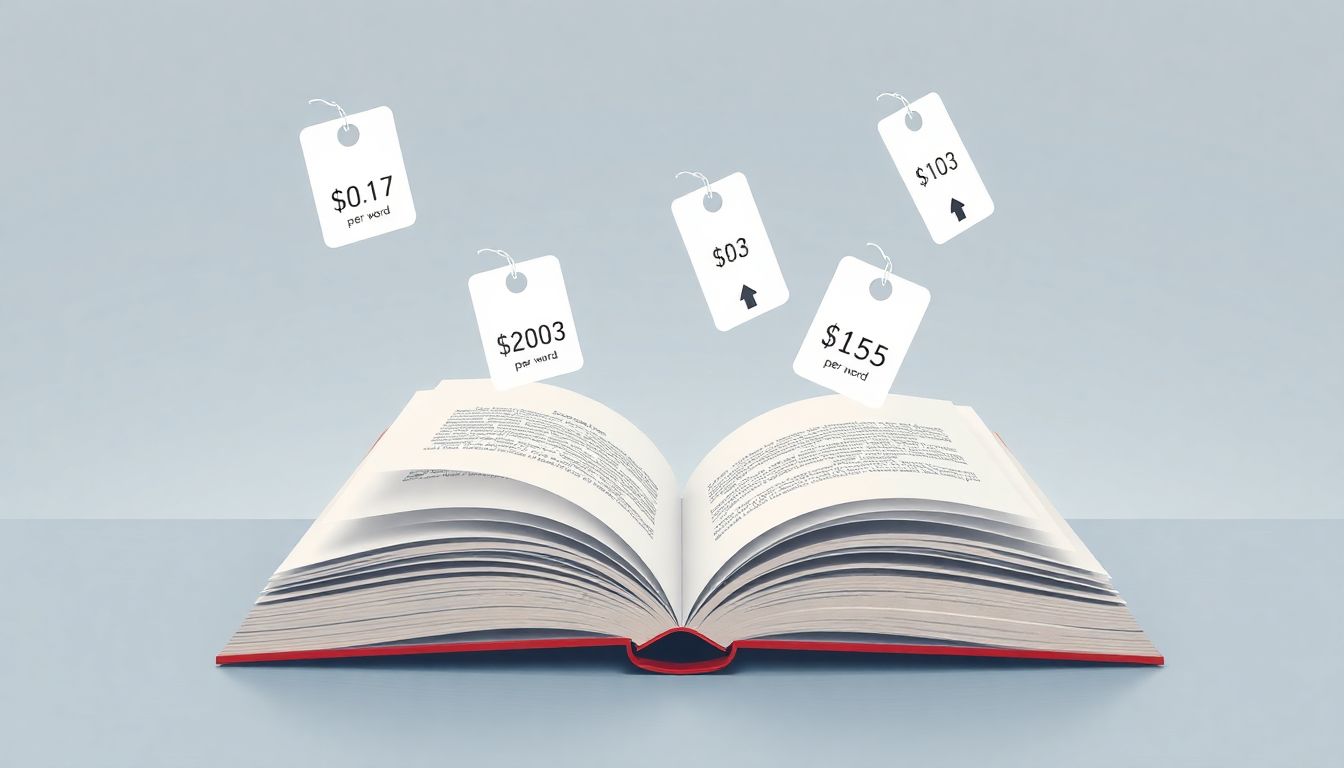Setting freelance editing rates isn’t always easy—you don’t want to set prices so high clients run away, but you’re probably tired of shortchanging yourself too. Trust me, we’ve all been there.
Stick with me, because you’re about to get practical steps on choosing a pricing strategy and figuring out your sweet spot based on experience, project details, turnaround times, and industry norms.
Ready? Let’s jump right into it.
Key Takeaways
- Know average editing rates: Proofreading ($0.017–$0.025 per word), copyediting ($0.03–$0.06), and developmental editing ($0.03–$0.07).
- Choose a pricing model based on the project’s clarity: per-word (straightforward jobs), hourly (complex tasks), flat rates (simple and predictable projects), or per-page (standardized documents).
- Adjust your prices according to your skills and experience—start lower to gain experience, then gradually increase.
- Charge higher rates for complex or specialized work, such as technical or medical content.
- Add a premium (around 25–50%) for rush or tight-deadline projects.
- Consider package pricing for larger or multi-step editing projects.
- Regularly review industry standards through reliable editing resources and adjust your prices yearly.

Step 1: Understand Average Freelance Editing Rates
If you’re thinking about offering editing services, you’ll first need to know what editors usually charge, so you don’t undersell yourself or scare away clients with unrealistic prices.
Average freelance editing rates can vary quite a bit according to the type of editing you’re providing:
- Proofreading: typically around $0.017–$0.025 per word or $30–$45 per hour.
- Copyediting: general content goes for $0.03–$0.06 per word, fiction between $0.02–$0.03 per word, and specialized areas like legal editing up to $0.15 per word. Hourly rates usually fall between $35–$55.
- Developmental editing: often nets editors $0.03–$0.07 per word, averaging around $45–$75 per hour.
You can even charge per page, usually somewhere between $5 and $10 per page, or create project-based packages for smaller tasks—like editing short stories or essays. Thumbtack lists flat project rates like $100 for up to 2,000 words, and $125 for 2,000–3,999 words.
The key is understanding what people typically pay, then finding a sweet spot where you feel your time and skills are valued properly.
Step 2: Choose Your Pricing Model
Now that you’ve got the average figures in mind, you have to decide exactly how you’re going to charge clients. You have several good options:
- Per-word Pricing: Simple and clear—clients immediately know how much they’ll be paying. Usually best for straightforward jobs or longer texts (novels, reports).
- Hourly Pricing: Ideal for projects where it’s tougher to predict exactly how long it’ll take. Think developmental editing or complex academic articles.
- Flat Project Pricing: Good for smaller or more predictable projects, like short stories or easy-to-estimate manuscript lengths. Clients usually appreciate knowing the total upfront.
- Per-Page Pricing: Works well with academic or standardized documents, where each page usually takes the same amount of effort.
If you’re just starting out, a fair approach might be to offer flat rates or clearly defined per-word rates, so you and your client both have straightforward expectations. For instance, if you’re helping someone figure out how to get a book published without an agent, a per-word or flat project price might work best since manuscripts often have clear word-count expectations.
Step 3: Set Your Rate Based on Experience and Expertise
We’ve covered averages, but remember: rates can and should vary based on your particular skill level and expertise. Editors with specialized skills—think technical editing, medical or legal texts, or those experienced in projects needing detailed, high-level critique—can confidently price towards the higher end of these spectrum.
- Beginner Level: If you’re new to editing, it’s fine to set rates near the lower end of industry standards to build your portfolio—but don’t undervalue yourself! Charging $0.017 per word for proofreading or $30 per hour for simpler edits can help you get initial projects without compromising industry standards.
- Intermediate Level: After a few successful projects and solid client feedback, nudge your prices up accordingly. Mid-level editors can comfortably charge closer to $0.03–$0.04 per word for copyediting.
- Expert Level: If you’ve built solid expertise, specialized knowledge, certifications, or have worked extensively in publishing houses or as a professional editor, don’t hesitate to charge top-level rates. Many reputable editors comfortably earn $60+ per hour or $0.06+ per word, especially on specialized topics or demanding developmental edits for complex manuscripts.
And always remember—your rate is not set in stone, so experiment a bit and adjust as your expertise grows. If you’re editing a fun creative project—like helping someone shape their horror story plot—you might go with standard mid-range rates, but if you’re tackling a deeply technical manuscript or academic dissertation, leaning towards the higher pricing scale reflects the complexity involved more accurately.

Step 4: Consider Project Complexity and Editing Type
Not all editing projects are created equal, so your rates shouldn’t be, either.
Complex, specialized editing—think legal documents requiring accuracy down to the letter or medical publications with intricate terminology—usually justify higher prices, around $0.15 per word (AIR’s Editorial Rate Guide gives some insights on specialty editing).
Meanwhile, simpler projects, like proofreading a novel or polishing short articles, usually fall on the lower end of the scale, around $0.017–$0.025 per word.
Take developmental editing—you’re not just correcting grammar; you’re providing comprehensive feedback on structure, character arcs, plot holes, and pacing, just like helping someone shape their dystopian story plot.
This higher level of detail explains why developmental editing rates average between $0.03–$0.07 per word (about $45–$75 per hour according to Step 5: Adjust Your Rates for Turnaround Time
Ever experienced those rush projects when a client just needs editing done yesterday? Yeah, everyone’s been there, but don’t stress—this is actually a great opportunity to charge higher rates. Urgent tasks mean adjusting your schedule, prioritizing the rushed project, and potentially working during your off-hours. It’s absolutely okay—even expected—to set premiums for speed. Typical rush rates involve adding around 25%–50% to your standard rate, depending on how tight the turnaround really is. For instance, if you normally charge $0.03 per word for copyediting, a 24-hour turnaround might justify a jump to $0.04–$0.05 per word. Make sure your clients understand upfront—even a quick “sure, I can deliver by tomorrow, but it’s going to be at a higher rush rate” conversation helps avoid surprises and respects everyone’s boundaries. If someone asks you to edit a tiny short story, charging per page or per word is fine, but what about longer projects like books or novel manuscripts of 50,000–100,000 words? This is where package pricing makes sense. For instance, Thumbtack suggests commonly used flat pricing for shorter projects: But as word counts tip past the 50K mark, it might make sense to create specialized packages more appealing to clients—like an “all-in-one manuscript package” that includes developmental editing, a proofreading round, and one follow-up consultation at an attractive flat price. For instance, helping a client refine their manuscript for self-publishing without an agent could become a neat bundle that clients find attractive. Not only do these packages simplify your workload, but they also present your editing services more professionally—and ultimately help boost repeat business. You might be in Los Angeles charging competitive California-based prices, but don’t forget—clients can almost always find editors online from anywhere. Keeping track of industry standards can help you price your services wisely: Checking resources like Reedsy, Thumbtack, or industry editorial groups regularly can ensure your prices stay relevant in the marketplace. Keep an eye on regional pricing, too—U.S. editors often charge differently than their counterparts in Canada or the UK, and understanding these variations can give you insight in pitch negotiations or client interactions. Pricing yourself too low might get you gigs immediately, but trust me—clients who expect low-ball rates become difficult to transition upwards. Avoid pricing on just guessing or fear of rejection; instead, use concrete data from trusted sources as your starting point. On the flip side, pricing too high with no specialized experience can limit your client base, especially early on. Here’s a better strategy: The editing industry definitely isn’t static, and neither should your editing rates be. Every year, take some dedicated time (maybe around tax season—isn’t that cheerful?) to evaluate your rates based on: Even experienced freelance editors often slightly raise prices year-over-year in line with increased expertise, skill sets, and cost-of-living adjustments. When you update rates, communicate transparently with repeat clients through friendly emails explaining why your prices are rising—clients appreciate honesty and clarity. Remember, pricing isn’t scary—it’s a sign you’re growing professionally, and clients will respect your clear approach and fair value. The right pricing model depends on your projects and goals. Hourly rates work well for flexible tasks, per-project rates are useful for predictable workloads, and per-word pricing suits clearly defined editing assignments like proofreading manuscripts or articles. Review average industry rates and match your skillset accordingly. Beginners charge low-to-mid rates to attract initial clients. Experienced editors with specialized skills and strong client portfolios set higher rates reflecting their advanced expertise and established reputation. Yes, urgent projects often justify higher rates. A quicker turnaround means prioritizing this project over others and possibly working longer or odd hours, so clearly communicating a fee increase for short deadlines is understandable and common. Evaluate and revise your editing rates at least once or twice a year. Regular checks ensure your fees align with your increasing skills, current market conditions, economic factors, and competitor pricing trends, helping you remain competitive and fair.Step 6: Factor In Project Length and Package Pricing
Step 7: Check Industry Standards and Regional Pricing Trends
Step 8: Avoid Common Pricing Mistakes
Step 9: Review and Update Your Rates Regularly
FAQs
